|
December 3, 2020 - No. 82
California Proposition 22
Lessons to Be Learned on How
Super Exploitation of Gig Workers
Is Made Legal
- Workers' Centre of
CPC(M-L) -
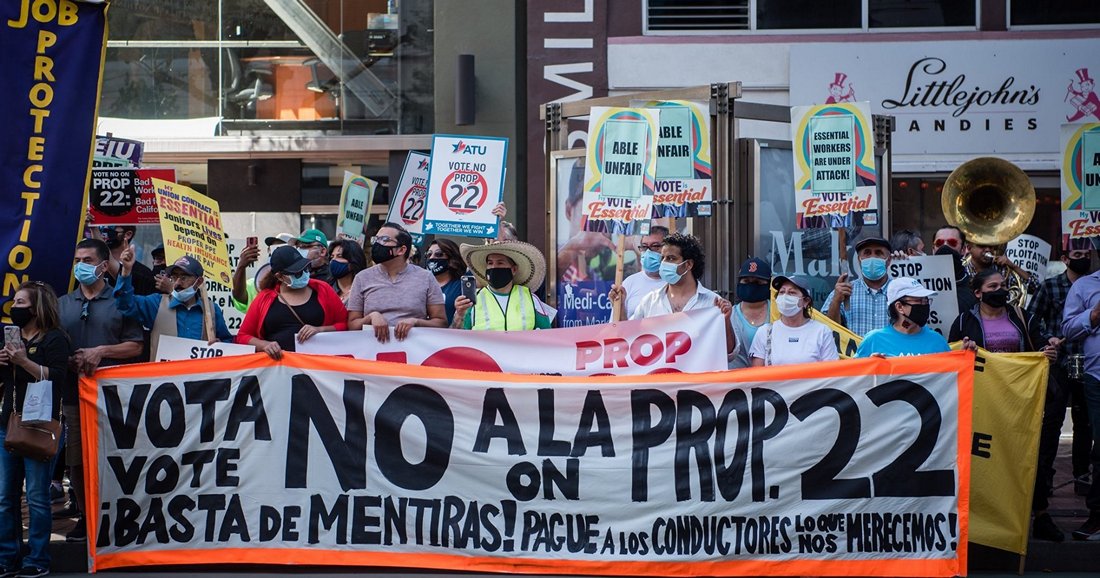
November 4, 2020. Demonstration by gig workers
against Proposition 22. (B. Anderson)
• Imperialist Democracy on
Ugly Display in California
• Corrupt Electoral Process
to Ensure Government of Powerful Private
Interests
• What It Means to
Legally Deny Network Workers Their Status as
Workers - K.C. Adams
• The Case for Voting
"No" on CA Prop 22 (Excerpts)
• Most Ride-Hailing
and Delivery Workers in San Francisco Not
Eligible to Vote
California Proposition 22
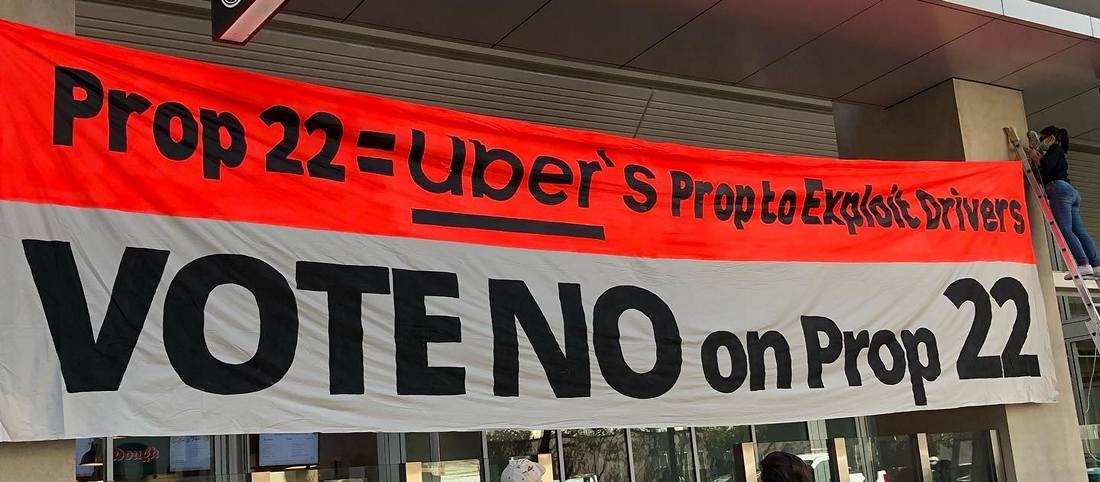
The Workers' Centre of the Communist Party of
Canada (Marxist-Leninist) is devoting this issue
of Workers' Forum
entirely to how the network companies, Uber,
Lyft, Instacart, Postmates
and DoorDash, have acted in California to
legally deny
network workers their status as workers. They
did this using
"Proposition 22," which passed November 3. The
aim of Proposition 22 is
to give the network companies the legal
authority to get away with
super-exploiting network workers with impunity.
The network companies
operate internationally and they have combined
forces in cartels and
coalitions to push their narrow private
interests, including their
refusal to provide even a minimum wage or
compensate their drivers for
work done. Based on their achievement in
California, they have now made
it clear that they expect to extend these
efforts. "Going forward,
you'll see us more loudly advocate for new laws
like Prop 22,"
Uber CEO Dara Khosrowshahi declared.
Drivers for network companies, also referred to
as gig workers, are already a super-exploited
section of the working class. They have been
organizing for several years in many countries,
including Canada, to defend their rights.
Actions included strikes against Uber and Lyft
on March 25, 2019. In May of that year, drivers
organized collectively and held a day of action
with strikes against Uber in at least 10 U.S.
cities and on five continents.
In California, in particular, drivers have
formed their own organizations, such as
Rideshare Drivers United (RDU). RDU was a main
force in the 2019 actions and has grown to about
19,000 members. Individuals have taken
initiative to join with others to create their
own networks and Facebook pages to communicate
with each other and assist in solving problems
and countering the companies' unjust actions
against them. One San Francisco driver, for
example, developed a contact list of 4,000
drivers he directly knew -- quite an
accomplishment given the transitory nature of
the work. These workers, many of them Yemeni and
other recent immigrants, worked to strengthen
their collective efforts to defend their rights.
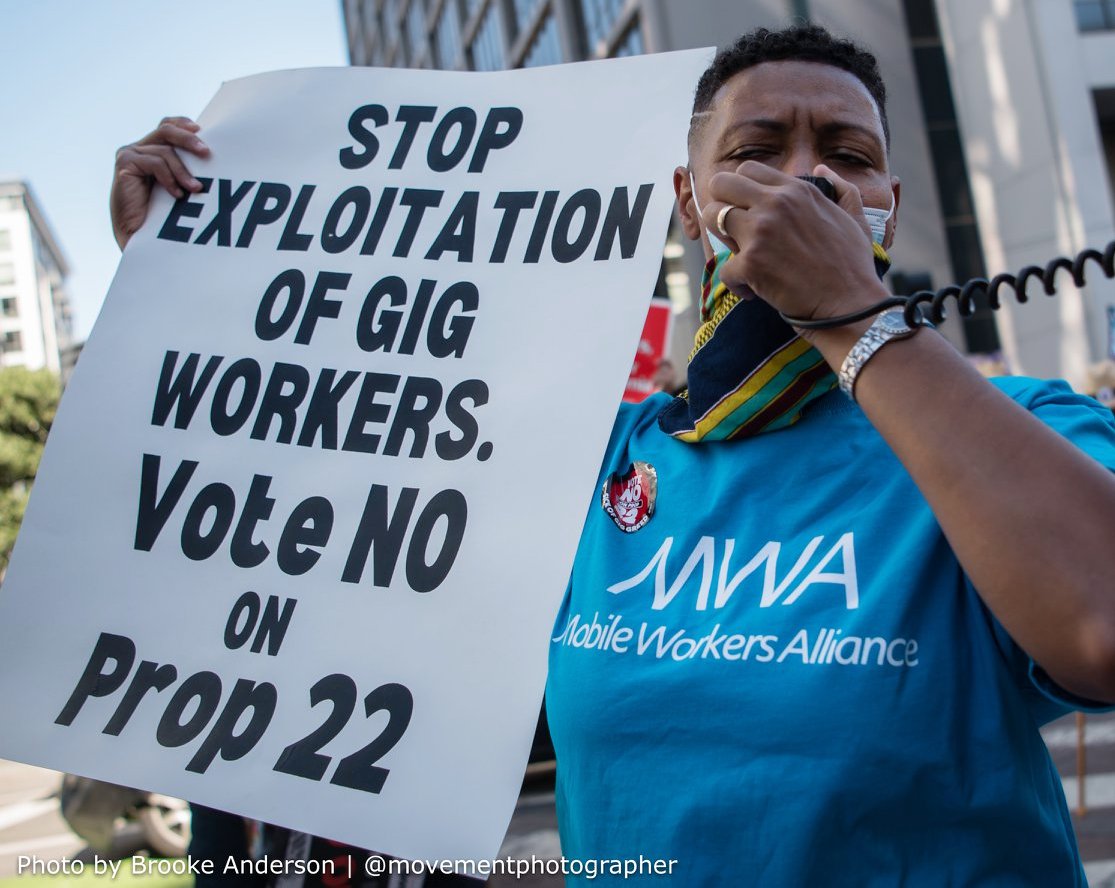 These organizing
drives were largely responsible for the passage
of California Assembly Bill 5 (AB5) -- a state
law classifying rideshare and delivery drivers
of the network companies as employees, not
"independent contractors." AB5 puts the burden
of proof for classifying individuals as
independent contractors on the hiring entity.
AB5 entitles workers classified as employees to
avail themselves of California's minimum wage
laws, sick leave, and unemployment and workers'
compensation benefits, for which companies must
pay payroll taxes These organizing
drives were largely responsible for the passage
of California Assembly Bill 5 (AB5) -- a state
law classifying rideshare and delivery drivers
of the network companies as employees, not
"independent contractors." AB5 puts the burden
of proof for classifying individuals as
independent contractors on the hiring entity.
AB5 entitles workers classified as employees to
avail themselves of California's minimum wage
laws, sick leave, and unemployment and workers'
compensation benefits, for which companies must
pay payroll taxes
AB5 was signed into law on September 18, 2019,
and came into effect January 1, 2020. Uber and
Lyft responded by refusing to abide by the law
or court injunctions requiring them to classify
the workers as employees. Drivers took action by
organizing demonstrations in San Francisco and
Los Angeles. The companies then formed their own
cartel to have their own law, Prop 22, passed
through a corrupt electoral process on November
3. They hired "labour" lawyers to write the Prop
22 legislation for the November 3 referendum in
a manner which specifically favours their
private interests in opposition to the interests
of workers. The target of the legislation is
clearly spelled out in Prop 22:
"Notwithstanding any other provision of law,
including, but not limited to, the Labour
Code, the Unemployment Insurance Code,
and any orders, regulations, or opinions of the
Department of Industrial Relations or any board,
division, or commission within the Department of
Industrial Relations, an app-based driver is an
independent contractor and not an employee or
agent with respect to the app-based driver's
relationship with a network company."
The network companies demand the right to force
individual workers to sign a company contract
before selling their capacity to work to the
company and beginning work. Prop 22 reads:
"A network company and an app-based driver
shall enter into a written agreement prior to
the driver receiving access to the network
company's online-enabled application or
platform." The contract denies the right of the
contracted workers to claim their rights
individually outside of what the contract
declares or to unite with other contracted
workers to defend their rights collectively.
To consolidate the legislated tyranny and to
deny any chance of it being overturned, the Prop
22 legislation reads in subdivision (a):
"After the effective date of this chapter, the
[California] Legislature may amend this chapter
by a statute passed in each house of the
Legislature by rollcall vote entered into the
journal, seven-eighths
of the membership concurring." (Emphasis
added.)
To make the point clear that tampering with the
legislation is not permitted, Prop 22 reads:
"No statute enacted after October 29, 2019, but
prior to the effective date of this chapter,
that would constitute an amendment of this
chapter, shall be operative after the effective
date of this chapter unless the statute was
passed in accordance with the requirements of
subdivision (a)."
In other words, any amendment or tampering with
the basic tenet of Prop 22 that network workers
are not really employees and must accept the
legislated terms of employment to work requires
"seven-eighths of the membership concurring."
Prop 22 exempts network companies from AB5 that
requires companies to grant workers employee
status based on an "ABC test." The test declares
a worker is an employee, rather than an
independent contractor, "if his or her job forms
part of a company's core business, if the bosses
direct the way the work is done or if the worker
has not established an independent trade or
business."
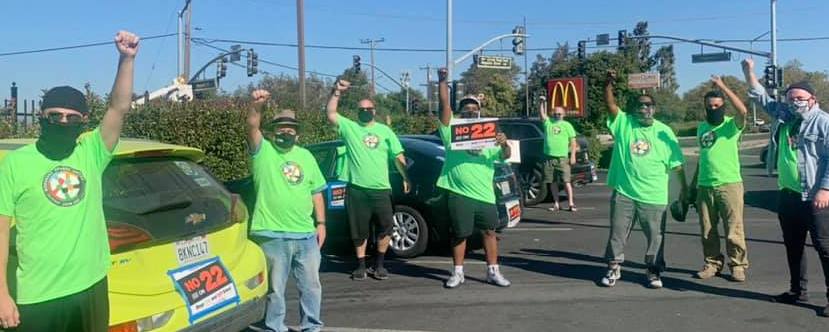
The drivers organized broadly against
Proposition 22 and the lies and disinformation
spread by the companies, claiming it would
benefit the workers. This included
demonstrations calling on people to vote no,
drawing more forces into the organizing efforts
and reaching out to the public with educational
materials.
Among their demands are: Set hourly minimum
pay matching New York City's $27.86 per hour
before expenses, the right to organize without
retaliation and recognition of independent
organizations of drivers to negotiate for
workers. Indicating their concern for the public
and environment they also asked the networks to
show the complete fare breakdown with Uber or
Lyft's take on the passenger's receipt and set
emission standards for all new vehicles added to
the platforms. In this manner the drivers are
striving to take up their social responsibility
to defend their interests and that of the
public. The network companies, on the other
hand, are fighting for the opposite, including
by failing to provide COVID-19 protection.
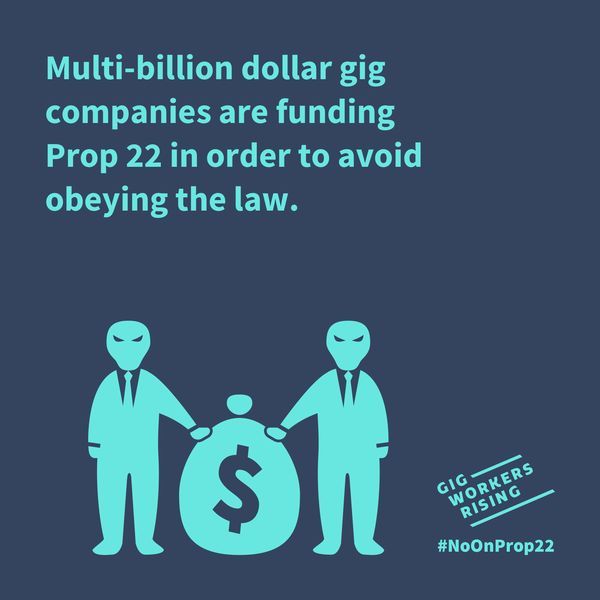 Prop 22 is a
means to criminalize organizing efforts while
also providing a constant supply of vulnerable
workers to exploit. Its aim to enshrine in law
that the companies have no social
responsibilities of any kind is not going to be
accepted by workers anywhere and will be fought
tooth and nail. The workers' movement in the
United States, Canada and internationally is
fighting for justice and modern arrangements
which affirm the rights of all. The workers'
movement does not recognize the definition of
rights said to be legal by the corrupt ruling
class which is in contempt of both the word
rights and the conception of rule of law. A
right is a matter of making the claims that
human beings must make to affirm their humanity.
If it is not even seen to be just, it will be
defied. Prop 22 is a
means to criminalize organizing efforts while
also providing a constant supply of vulnerable
workers to exploit. Its aim to enshrine in law
that the companies have no social
responsibilities of any kind is not going to be
accepted by workers anywhere and will be fought
tooth and nail. The workers' movement in the
United States, Canada and internationally is
fighting for justice and modern arrangements
which affirm the rights of all. The workers'
movement does not recognize the definition of
rights said to be legal by the corrupt ruling
class which is in contempt of both the word
rights and the conception of rule of law. A
right is a matter of making the claims that
human beings must make to affirm their humanity.
If it is not even seen to be just, it will be
defied.
The fact that the coalition of network
companies Uber, Lyft, Instacart, Postmates and
DoorDash banded together in California to
write and pass the legislation to block
organizing efforts and ensure a constant supply
of vulnerable workers, indicates they will do a
similar job in Canada where the oligopolies are
already acting to get legislation in their
favour through parliaments and legislatures.
Working people are setting an example by
stepping up their resistance and increasingly
organizing to reject the actions of narrow
private interests like Uber and Lyft. They are
taking up their social responsibility to defend
the rights of all and striving to take the
country in a new direction.
Workers' Forum is at the disposal of the
organizing efforts of all gig workers.

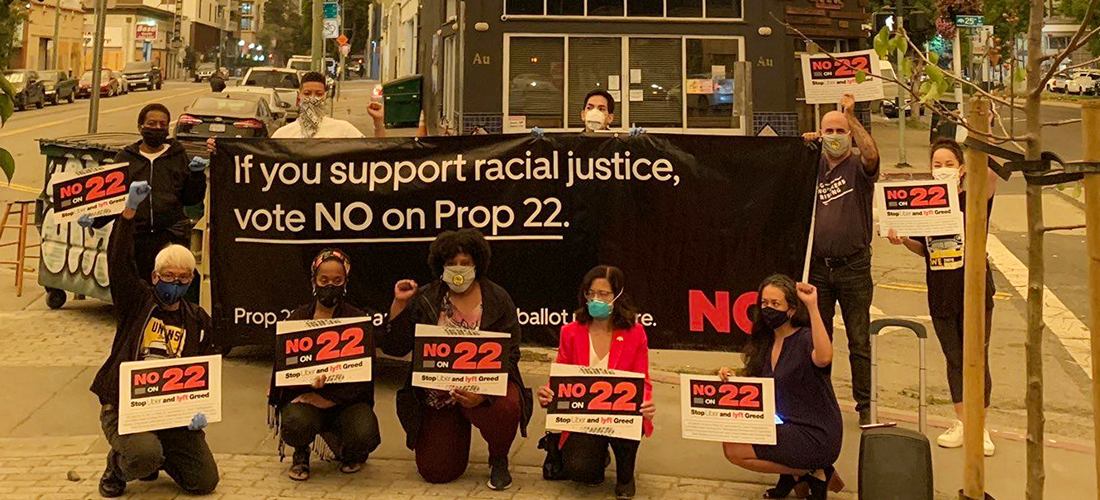
To guarantee the passage of Prop 22 during the
November 3 California referendum,
the network companies formed a cartel with a war
chest of over $200
million. They bombarded the people of the state
with relentless ads,
text messages, push notifications, emails and
even fliers included in
delivered packages. The Los Angeles Times
reports, "Yes on Prop
22 spent $628,854 a day. In any given month,
that ends up being more
money than an entire election cycle of
fundraising in 49 of
California's 53 House races." Delivery drivers
and cyclists were forced
to use Yes on Prop 22-branded packaging while
the apps themselves
badgered workers and even the people using them
for rides and delivery
to
vote Yes.
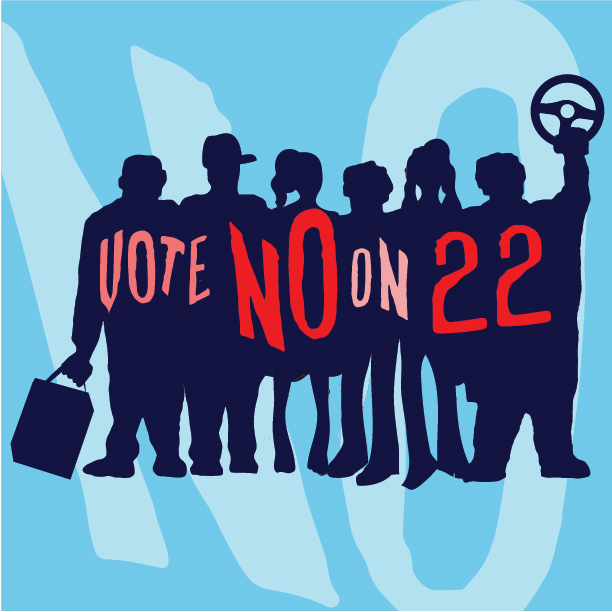 The network companies hired 19 public relations
firms to work on
the Yes campaign, some of which were already
notorious for having been
paid to prettify and defend Big Tobacco. The
network companies bought
civil society organizations to promote Prop 22
as something progressive
with a human face. For example, they made a
"donation" of $85,000 to a consulting firm run
by Alice Huffman, former
head of California's National Association for
the Advancement of
Coloured People (NAACP). The network companies
used the NAACP
"endorsement" to present Prop 22 as something
positive for the
descendants of African chattel slavery, further
confusing the issue for
many in California.
The network companies hired 19 public relations
firms to work on
the Yes campaign, some of which were already
notorious for having been
paid to prettify and defend Big Tobacco. The
network companies bought
civil society organizations to promote Prop 22
as something progressive
with a human face. For example, they made a
"donation" of $85,000 to a consulting firm run
by Alice Huffman, former
head of California's National Association for
the Advancement of
Coloured People (NAACP). The network companies
used the NAACP
"endorsement" to present Prop 22 as something
positive for the
descendants of African chattel slavery, further
confusing the issue for
many in California.
The PR firms with their vast connections in the
mass media blanketed
the state with Vote Yes on Prop 22 propaganda.
The Vote Yes campaign
bought digital, television, radio, and billboard
ads, and paid for
academic research suggesting workers would be
better off without their
rights codified in law. Uber and Lyft's chief
executives
undertook a media tour featuring threats to exit
the state if Prop 22
failed to pass. In the end, according to a poll,
over 40 per cent of
those who voted yes said they did so thinking it
was a vote in defence
of workers' rights and well-being. The workers
however have not been
deterred from their struggle. They continue to
fight and organize, not
only for their rights as workers but also as
women and immigrants, who
constitute a large portion of the workforce.
The Prop 22 referendum was imperialist
democracy on ugly display
using money and mass media to bring into being
legislation of, by and
for powerful private interests. The demand to
have the right to put
referendums on the ballot in California was part
of efforts by the
people to have a say in legislation. However, as
written, it does not
prevent the type of massive corrupt moneyed
campaign to vote Yes for
Prop 22 that took place. The same money and
electoral system that
pushed through Prop 22 pushes the two main
parties of the rich -- the
Democrats and Republicans -- into government in
California and
throughout the United States.
The fight against Prop 22 and for the rights of
network company
workers brought to the fore the problems with
the existing electoral
system and the need for democratic renewal. The
fact that the drivers
took their stand and fought against Prop 22
shows their recognition of the need to
have more of a say in political affairs and to
block the giant
monopolies from manipulating the public. Their
continuing struggle
shows they are rejecting efforts by the
monopolies to define who they
are and what their rights are.
The existing electoral process routinely
excludes large numbers of
workers, such as immigrants who are
undocumented, those in prison,
those not registered, etc. For Prop 22, an
estimated 32 per cent of the
voting age population secured its passage.
Another 22 per cent voted no
and the remaining 56 per cent did not vote --
meaning the large
majority did not support it. Similar figures
exist for statewide and
federal elections, where presidents are elected
with about 25 per cent
of the vote. It is not a process that represents
the people, their
concerns or solutions. The drivers, along with
the millions opposing
racist police killings, separation of immigrant
families, fighting for
equality and
justice indicate that the people are fighting
for control over their
lives and for a political system that embodies
that.
Note
Results of California Vote
on Proposition 22 in November 3, 2020
Election
Voters must be eligible to vote
in California election and register to vote 15
days prior to the vote.
Proposition 22 -- App-Based
Drivers and Employee Benefits -- For and
Against
Yes (for) = 9,874,555 58.6 per
cent of voters
No (against) = 6,979,133 41.4
per cent of voters
Total voters = 16,853,688
California population 2019 =
39,512,223
California population 18 years
and older = 30,621,973 (77.5 per cent)
Total voters on Prop 22 as
percentage of population 18 years and older =
55 per cent
Total voters voting Yes on Prop
22 as percentage of California population 18
years and older = 32 per cent
Total voters voting No on Prop
22 as percentage of California population 18
years and older = 22.8 per cent
October 1, 2019 -- 20,328,636
Californians registered to vote.
Registered voters as percentage
of California population 18 years and older =
66 per cent
Number of persons not
registered to vote but 18 years and older =
10,293,337
The California Secretary of
State says that the number of Californians
registered to vote as percentage of eligible
voters = 80.65 per cent
This means that the state's
estimate of eligible voters = 25,205,996
California population 18 years
and older = 30,621,973
California population 18 years
and older not officially recognized as
eligible to vote = 5,415,977
To be officially eligible to
vote a person must be:
- A
United States citizen and a resident of
California,
- 18 years old or older on Election Day,
- Not currently in state or federal prison or
on parole for the conviction of a felony (for
more information on the rights of people who
have been incarcerated, please see the
Secretary of State's Voting Rights: Persons
with a Criminal History), and
- Not currently found mentally incompetent to
vote by a court (for more information, please
see Voting Rights: Persons Subject to
Conservatorship).
For the complete text of
Proposition 22 click
here.

- K.C. Adams -
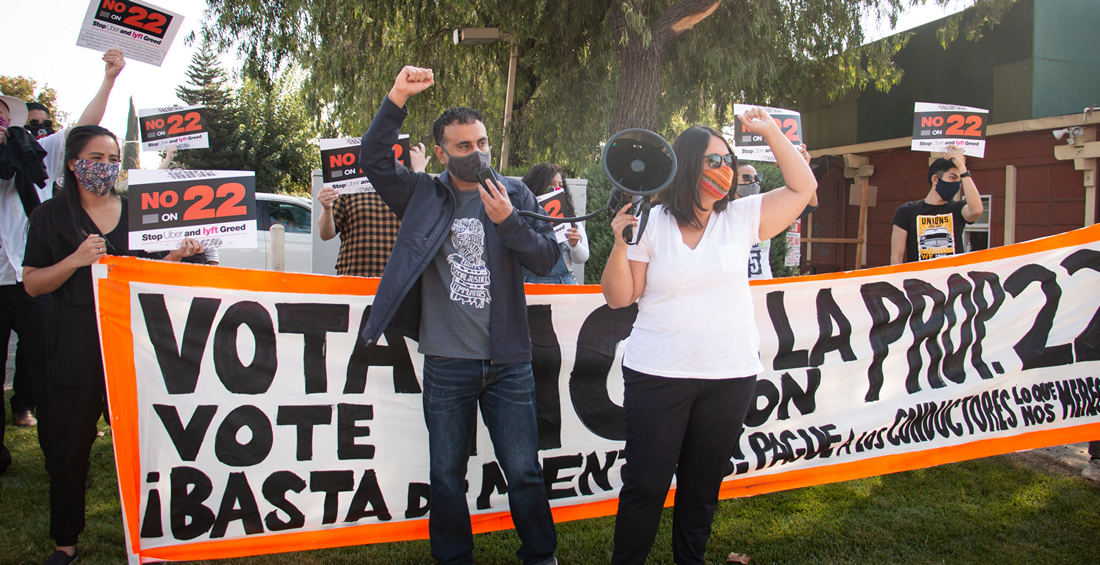
Imperialist network
companies force their social irresponsibility
into California law
Hundreds
of thousands of California workers involved in
the rideshare and
package delivery industry have been declared
non-workers in law. Yet,
in contradiction with their imperialist
definition, the oligarchs
holding political power have also forced terms
of employment, a
state-dictated collective agreement, on the
so-called "non-workers."
Needless to say, the rideshare and delivery
"non-workers" had no say or
control over their dictated terms of employment
nor the chance to give
their specific collective or individual approval
or disapproval. They
have however shown their rejection of the
dictate in Prop 22,
demonstrating and organizing against it and
continuing now despite its
passage.
 Five imperialist
network companies involved in transporting
people and delivering prepared food have forced
into law a declaration that is anti-worker,
irrational in content and profoundly
irresponsible. Five imperialist
network companies involved in transporting
people and delivering prepared food have forced
into law a declaration that is anti-worker,
irrational in content and profoundly
irresponsible.
The
five network companies financed and pushed into
California law
Proposition 22 to avoid their social
responsibility to pay payroll fees
for workers' compensation for work-related
injury and illness,
unemployment insurance and company-paid health
care insurance agreeable
to the workers themselves, and to evade various
state mandated legal
norms on minimum wages, sick pay, overtime and
holidays. The legal
definition as "non-workers" also makes it more
difficult for network
company workers to organize into their own
collectives to defend their
rights and to legally negotiate terms of
employment, within collective
agreements with their employers. As the workers'
demands bring out,
these include increased wages, compensation for
all work, and efforts
to protect the environment and the public,
including better COVID-19
protections for them and passengers.
The five network companies at the forefront of
pushing social irresponsibility and drafting
government legislation are Uber, Lyft,
Instacart, Postmates and DoorDash. That the
state of California would even allow itself to
be manipulated into denying its social
responsibility to protect its people and agree
to powerful private interests dictating law
speaks volumes about the necessity for
democratic renewal, empowerment of the
people and a new pro-social direction for the
economic, political and social affairs of the
state and country.
California is home to a large array of
imperialist network companies such as Google and
others employing millions of workers. Those
workers are members of the modern socialized
workforce. Whether they sell their capacity to
work to others or even to themselves as
cooperatives they are socialized workers who
require civilized norms of employment befitting
the modern socialized productive forces over
which they must have a say and control.
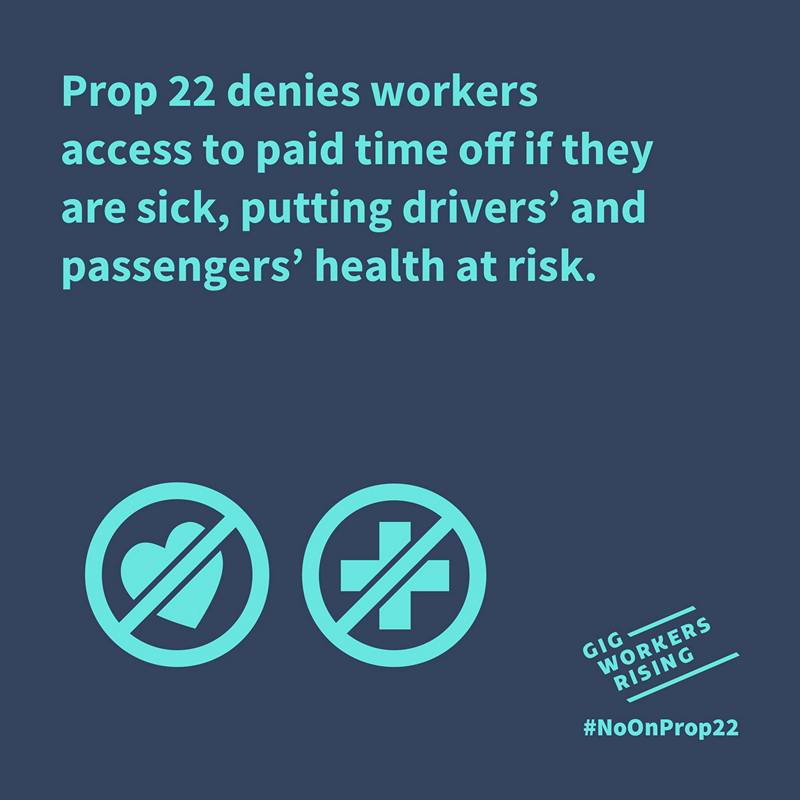 By denying
rideshare and delivery workers their status as
workers, the imperialists are denying the
reality of the modern workplace as it presents
itself and the necessity at this time for
equilibrium in the relations of production. They
are denying that workplace injury and illness is
commonplace; they are denying that periodic
unemployment occurs from either a general or
localized economic crisis such as the pandemic;
they are denying that the rich oligarchs who are
driven by their aim for maximum private profit
ever abuse their employees and that workers must
unite to defend their rights and have as a
minimum the legal right to do so. They are
denying that the socialized forces of production
are the only institutions from which working
people can acquire a living and find a means of
subsistence and are consequently forced to sell
their capacity to work to live; they are denying
that in general the imperialist economy consists
of a social relation between working people who
sell their capacity to work to those who own and
control the socialized means of
production. By denying
rideshare and delivery workers their status as
workers, the imperialists are denying the
reality of the modern workplace as it presents
itself and the necessity at this time for
equilibrium in the relations of production. They
are denying that workplace injury and illness is
commonplace; they are denying that periodic
unemployment occurs from either a general or
localized economic crisis such as the pandemic;
they are denying that the rich oligarchs who are
driven by their aim for maximum private profit
ever abuse their employees and that workers must
unite to defend their rights and have as a
minimum the legal right to do so. They are
denying that the socialized forces of production
are the only institutions from which working
people can acquire a living and find a means of
subsistence and are consequently forced to sell
their capacity to work to live; they are denying
that in general the imperialist economy consists
of a social relation between working people who
sell their capacity to work to those who own and
control the socialized means of
production.
By
doing so, the imperialists have brought to the
fore two projects that
the working class is taking up: one, the
organizing of workers into
powerful independent collectives that defend the
rights of all and the
right of workers to a say and control over their
terms of employment.
The independent organizations of the rideshare
and delivery drivers as
well as the many that have formed as part of the
fight for equality,
justice and accountability, are examples in this
direction. Two, the
necessity to organize for democratic renewal to
overcome the current
tyrannical rule of private interests and bring
into being a genuine
government of the empowered people, by the
empowered people and for the
empowered people.

- Keith F. Eberl -
The writer Keith Eberl is a rideshare driver
in Los Angeles and organizer for Rideshare
Drivers United an independent driver-created
and driver-led association of 19,000
California drivers.
 Attorneys for
Uber, Lyft, and DoorDash wrote the 2020
California ballot initiative known as
Proposition 22. Contrary to the companies'
deceptive ad campaign and intimidating messages
to their workers, Prop 22 does not
preserve driver flexibility or save drivers from
politicians. What Prop 22 does do is
change current law so the companies can shift
their costs to the driver and diminish or remove
drivers' rights, protections, and benefits. Prop
22 will also block drivers' ability to organize
so they can't collectively bargain a contract.
In addition, this proposition will block local
governments from writing or enforcing
protections for drivers, such as in a crisis
like COVID-19, and will leave governments
footing the bill for the basic health and
welfare of drivers. Attorneys for
Uber, Lyft, and DoorDash wrote the 2020
California ballot initiative known as
Proposition 22. Contrary to the companies'
deceptive ad campaign and intimidating messages
to their workers, Prop 22 does not
preserve driver flexibility or save drivers from
politicians. What Prop 22 does do is
change current law so the companies can shift
their costs to the driver and diminish or remove
drivers' rights, protections, and benefits. Prop
22 will also block drivers' ability to organize
so they can't collectively bargain a contract.
In addition, this proposition will block local
governments from writing or enforcing
protections for drivers, such as in a crisis
like COVID-19, and will leave governments
footing the bill for the basic health and
welfare of drivers.
I should know. I have been a full-time
rideshare driver for four years and an organizer
with Rideshare Drivers United for three.
Rideshare Drivers United is an independent, Los
Angeles-based, driver-created and driver-led
association of 19,000 California rideshare
drivers. Our goal is to become a union and win a
voice on the job, fair pay, and dignity for the
work we do. [...]
From their start, the app-based companies'
business models have depended on using drivers
like employees while treating them as
independent contractors so that the companies
can shift their costs to the drivers. This is
why we have seen and heard so much in the news
about class-action lawsuits against Uber and
Lyft for misclassifying their drivers as
independent contractors.
In 2018, the California Supreme Court ruled in
favour of truck drivers who sued the Dynamex
company for the same reason. The court adapted
what's known as the "ABC test" used by
Massachusetts and New Jersey to determine that
the truckers were in fact employees of the
company, and so the "Dynamex" decision became
the law of the land in California. In 2019, this
test was written into a California bill called
"AB5" to define what an independent contractor
is. [...]
None of Prop 22 originated from workers or
their elected representatives. In fact, because
the companies have been ignoring current wage
laws, Rideshare Drivers United built an online
tool to help more than 5,000 California drivers
file wage claims with the California Labor
Commission against Uber and Lyft for unpaid
wages, expense reimbursements, and damages
totaling over $1.3 billion. This action was
called "People's Enforcement of AB5." [...]
In June of this year, the California Attorney
General sought an injunction from the courts to
force the companies to cease misclassifying
their workers and comply with the law. Instead,
in old-style union-busting fashion, Uber and
Lyft began to incite fear in their workers and
the public by threatening to close up shop in
California if the injunction was granted,
putting tens of thousands of drivers out of
work. News outlets across the country lit up
with sensational headlines that rideshare in
California was facing imminent shutdown. "We'll
have to close the factory!" the company bosses
said. [...]
In the meantime, the companies have launched a
massive misinformation blitz to promote their
ballot initiative. Deceptive ads are showing up
in every corner of mass media and electronic ad
space you can find, including in the passenger
and delivery customer apps. [...]
So, after threatening to fire everyone and
leave town, company bosses are now barraging our
work apps with pop-up messages [...]. This is
happening every day, several times a day, in our
work space -- the apps on our phones.
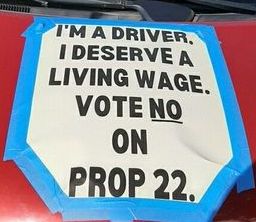 [... T]hese
faceless bosses try to confuse us. We are
presented with the message: "Prop 22 is
progress. Prop 22 will provide guaranteed
earnings and a healthcare stipend." Again, there
is no human interaction here, and no explanation
of what those are exactly or why that isn't
happening already, but we are presented with two
buttons: one marked "Yes on Prop 22" and the
other "OK." [... T]hese
faceless bosses try to confuse us. We are
presented with the message: "Prop 22 is
progress. Prop 22 will provide guaranteed
earnings and a healthcare stipend." Again, there
is no human interaction here, and no explanation
of what those are exactly or why that isn't
happening already, but we are presented with two
buttons: one marked "Yes on Prop 22" and the
other "OK."
Spreading fear and confusion amongst workers is
a classic union-busting tactic. (On October
22, drivers filed a lawsuit against Uber for
violating a California law that prohibits
employers from trying to influence employees'
political activities by threatening a loss of
employment). [...]
[Prop 22] would grant app-based transportation
and delivery companies a complete exemption from
AB5, freeing them from complying with
California's labour laws (which they have
flouted since their founding) and signalling
that corporations can establish a permanent
class of unprotected workers.
Prop 22 would strip or severely diminish
app-based rideshare and delivery drivers of our
right to a minimum wage, overtime, expense
reimbursement, healthcare, sick leave, workers
comp, safety regulations, anti-discrimination,
and the right to organize. But, it will still
allow the companies to use us workers like
employees because of the way they control us.
Let's have a look at the earnings and
healthcare aspects of Prop 22. Prop 22
eliminates basic workplace benefits and replaces
them with a new, lower "earnings guarantee" and
a "healthcare subsidy" payment designed to save
companies from footing the bill for the expenses
they would otherwise have under current law.
The "earnings guarantee" of pay would be equal
to 120 per cent of the minimum wage (that would
be $15.60 in 2021 when the California minimum
wage will be $13), but drivers would only be
paid for "engaged time." "Engaged" means "from
when an app-based driver accepts a rideshare
request or delivery request to when the
app-based driver completes that rideshare
request or delivery request." Drivers would not
be paid for time waiting for a ride request.
Since part of the company's business model is to
saturate some areas with an oversupply of
drivers, wait times can consume large parts of
every hour a driver is on the road, including
spending 30-45 minutes in the driver queue at
Los Angeles International Airport.
"Per-mile compensation for vehicle expenses"
under Prop 22 would be 30 cents per "engaged
mile" [...]
If drivers are in a densely populated urban
area that is saturated with other drivers and
have few places to stop legally, like downtown
Los Angeles on a weekday, drivers may find
themselves constantly on the move with no fare
or order to pick up and deliver. They will not
be compensated for miles driven without a rider
or delivery to pick up, even though they are
waiting for the company to send them work.
Under current law, however, workers must be
reimbursed for mileage at the standard IRS
mileage reimbursement rate, which for 2020 is
calculated at 57.5 cents per mile and isn't
restricted to "engaged miles" when calculating
reimbursement.
Drivers also know from experience that the
companies will not compensate us for downtime
caused by the need to stop work to clean after a
messy trip, to file an emergency report in the
app, or to respond to a company error or false
complaint against us that has caused a loss of
income, a suspension, or wrongful termination.
UC Berkeley Labor Center's wage assessment of
the ballot initiative found that "after
considering the multiple loopholes in the
initiative, the pay guarantee estimate for Uber
and Lyft drivers is actually to be the
equivalent of a wage of $5.64 per hour." The
authors say, "Not paying for [logged in but not
"engaged"] time would be the equivalent of a
fast food restaurant or retail store saying they
will only pay the cashier when a customer is at
the counter. We have labour and employment laws
precisely to protect workers from [this] kind of
exploitation." Prop 22 means workers would have
to work longer shifts just to earn a living wage
-- putting in more than 40 hours a week with no
overtime pay.
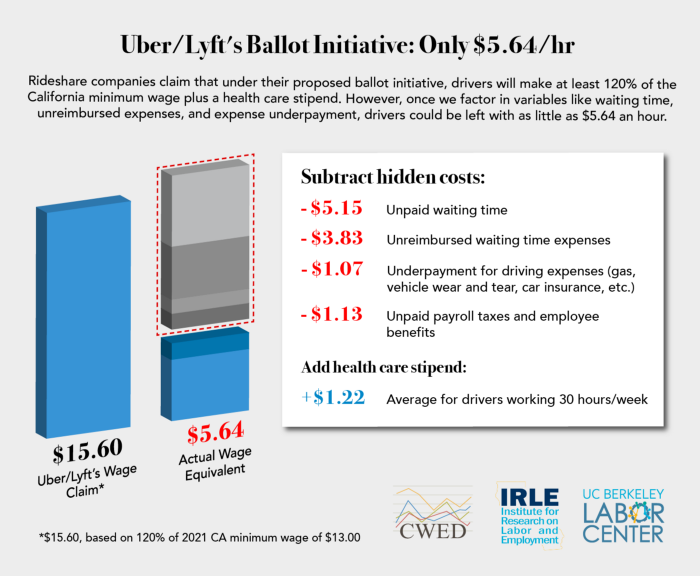
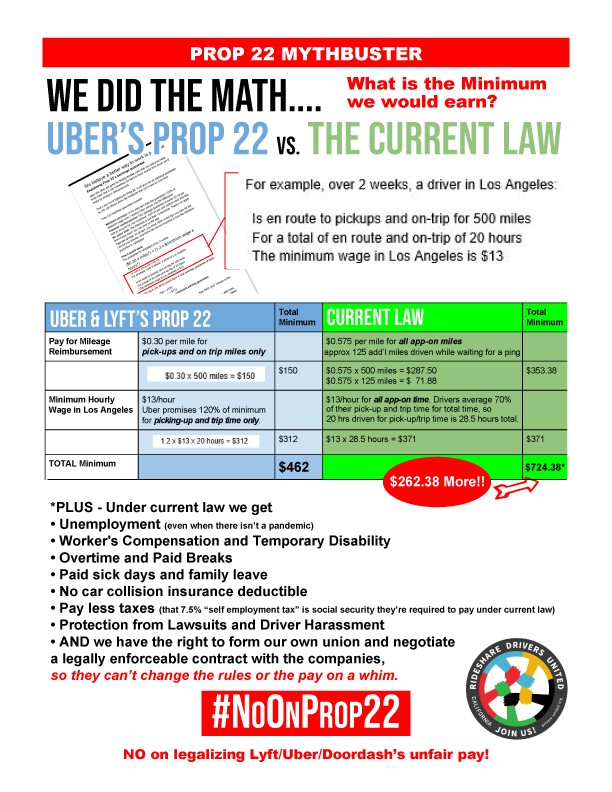
Let's look at this the way a driver like me
does -- basic. How much will I get paid for a
fare from Los Angeles Airport (LAX) to San
Clemente at night? A quick "ask Google" and it's
65 miles to San Clemente and one hour in no
traffic. I know from experience that an Uber X
fare like this pays out at roughly $52. (Pretty
lousy for the distance).
The exact fare I'd get paid would be $51.65,
because the Uber X fare in Los Angeles is at a
rate of $0.60/mi and $0.21/min (or $12.60/hr)
for the time when a passenger is on board.
If Prop 22 passes and it's now 2021, that same
fare would pay me at a rate of $0.30/"engaged
mile" and $15.60/"engaged hour" (or
$0.26/"engaged minute"). Again, "engaged time"
is from when I accept a ride request until I
drop off the passenger.
Now, I work mostly at LAX.... For the sake of
this exercise, let's say I would travel about
one mile from the holding lot and it would take
about 10 minutes until I had my passenger on
board if someone's waiting at the curb. At Prop
22 rates, that part pays $2.90. The part where I
have a passenger on board and drive all the way
to San Clemente at Prop 22 rates? That pays
$35.10. So the total payout for the same ride
from LAX to San Clemente at Prop 22 rates is $38
or $13.60 less than current Uber X rates.
Under current law, drivers have the right to be
compensated for all on-the-clock time,
reimbursed for work-related mileage at more than
double the Prop 22 rate, and reimbursed for work
related expenses. As employees, we have the
right to organize and negotiate a contract for
better than the bare minimum.
If Prop 22 passes, the app companies would
replace health insurance coverage with their
smaller "healthcare subsidy" payments designed
to save the companies money at the expense of
their workers' health and safety. After sifting
through the convoluted language of Prop 22 on
this health benefit, we find that the companies
have defined the maximum subsidy that any one of
them will pay a worker as just 82 per cent of
"the average statewide monthly premium for an
individual ... for a Covered California bronze
health insurance plan."
Covered California is where you shop for
"Obamacare." The lowest costing insurance plans
are in the "bronze" tier where you find plans
with the lowest premiums, but highest
deductibles and the least coverage. There are 12
bronze plans, but who you are and where you live
can have a dramatic effect on what your premium
is. So, how do you figure out the average for
the whole state across 12 bronze plans? Someone
at Covered California needs to figure it out
because Prop 22 is going to require them to
publish it. Until then, we don't know what we're
voting for.
Otherwise, there are two subsidy tiers you have
to work for to earn: either 41 per cent of that
bronze average, or 82 per cent of that bronze
average. Which one you earn depends on whether
you maintain an average of at least 15 "engaged
hours" or at least 25 "engaged hours" of work,
per week, for three months, respectively. If you
miss both you could get nothing. All of these
are paid to you quarterly. You can earn a
subsidy from more than one company, but there is
no provision for combining hours from them to
reach 15 hours or 25 hours of "engaged time".
The other conditions are: you must get and
provide proof of your own insurance with you
listed as the policyholder (not necessarily
through Covered California, apparently), it
cannot be sponsored by an employer, and it can't
be Medicare or Medicaid.... The authors of
"Rigging the Gig" found "as recent studies
(funded by the industry) have indicated, drivers
spend as much as 37 per cent of their time
logged into a transportation app, but without a
passenger." This means that most drivers would
have to log an extra 37 per cent more time on
the app -- more than 39 hours per week -- to
qualify for the top tier benefit of 82 per cent.
So, you will have committed yourself to paying
for an insurance plan that they will help you
pay for if you work enough hours (many of them
unpaid), but you have to pay for it yourself
until you get your quarterly payment from them
-- if there is one. God help you if you decide
to go on vacation/your car breaks down for a few
days/you have a family emergency or you get
injured and are unable to work. Not only will
you have no paid vacation, reimbursement for
repair expenses, or bereavement leave or sick
leave, you could also lose your premium
assistance, not for just one month but a whole
quarter.
Looking at Prop 22's "healthcare subsidy" as an
experienced rideshare driver, I immediately see
another big problem. I'm used to Uber's and
Lyft's performance-based bonus incentives, and
I'm also used to circumstances beyond my control
causing me to miss them. I still remember being
out driving at 3 am on a Monday needing just two
more L.A. fares before 4 am to score a big
bonus, and then catching one deep into Orange
County. Or worse, knowing that I did earn a
bonus, but someone at a call center refused to
give it to me over a location discrepancy
between the map display in the app and their GPS
records. So, now we're going to play that game
with my healthcare? Right. I stopped chasing
bonuses a long time ago because they are
unpredictable and unreliable as a source of
income.
This is Uber, Lyft, DoorDash, Instacart, and
Postmates' idea of healthcare. Cross your
fingers and take your best shot. These are not
rules for a new program they are rolling out.
This is what they are trying to put into law.
Their message: "If you want a stable healthcare
subsidy, try a taxpayer-funded one from Covered
California."
If you've ever heard the term "portable
benefits," this is what that will look like for
employees who get dropped from employee status
to a category such as the one that Prop 22 will
create, sometimes called a "dependent worker."
This is the future of work.
Keep all of that in mind as you read ahead.
The COVID-19 crisis has made conspicuous the
injustice communities of colour and immigrants
face when it comes to healthcare, especially for
app-based rideshare and food delivery workers
who are a majority of that workforce. In a May
2018 report released by the UCLA Labor Center,
of the 260 rideshare drivers UCLA surveyed from
around Los Angeles, 38 per cent were Latino, 23
per cent were Black, and 35 per cent were
foreign-born. Two years later, a description of
the app-based workforce in San Francisco emerged
in a study published by UC Santa Cruz Institute
for Social Transformation. In their survey of
643 app-based workers, 29 per cent were Asian,
23 per cent were Hispanic, 12 per cent were
Black, 13 per cent identified as multiracial or
other, and 56 per cent were foreign-born.
The Centers for Disease Control finds that
COVID-19 is taking a greater toll on those
communities because they have less access to
healthcare, sick leave, safe work environments,
and workers compensation. California,
unfortunately, is a potential case study. In a
July 15 article, the Los Angeles Times published an
analysis of statewide data finding that "for
every 100,000 Latino residents, 767 have tested
positive. The Black community has also been hit
particularly hard: for every 100,000 Black
residents, 396 have tested positive. By
comparison, 261 of every 100,000 white residents
have confirmed infections." L.A. County
officials were quoted as saying, "The underlying
reasons why communities of color are
disproportionately impacted by worse outcomes of
COVID is also related to longstanding structural
and systemic issues, including racism and
historical disinvestments, that L.A. County is
working to address and mitigate amidst this
pandemic." [...]
Meanwhile, drivers who are not eligible for
unemployment benefits or still need to work and
continue to drive have been forced to risk their
health and that of their families in order to
make a living. That is a choice that no worker
should have to make. Rideshare Drivers United
lost one of our own activists in San Diego to
COVID-19 in this way, and 28 other members
reported having been sick in an internal poll.
[...]
Early in the crisis the companies had been slow
to provide drivers with protective equipment
needed during the pandemic, including face
masks, sanitizer, disinfectant, and barriers
between drivers and passengers. [...]
Unemployment
The COVID-19 crisis has shown just how critical
unemployment insurance is to app-based rideshare
drivers and delivery workers. Since early this
year, the vast majority of rideshare drivers
have been put out of work due to the steep drop
in demand for their services and the health
risks associated with continuing to drive. [...]
Shortly after the COVID-19 crisis began, it
became apparent to lawmakers in Washington,
D.C., that a package of rescue legislation was
necessary and should provide money to people who
were put out of work. At that time, Khosrowshahi
(Uber CEO) lobbied Congress to provide some kind
of relief to his rideshare and delivery workers.
Ultimately this would come in the form of what
is known as Pandemic Unemployment Assistance
(PUA), a federally funded form of unemployment
insurance designed to get money to non-employee
workers who lost their income as fast as
possible.
The PUA unemployment benefit Khosrowshahi
lobbied so hard to "get" for his rideshare and
delivery workers is calculated on a worker's net
income, whereas in California the unemployment
insurance (UI) benefit is calculated on gross
earnings. Since app-based rideshare and delivery
drivers have such high expenses (that the
companies are supposed to reimburse drivers for
but don't) our net income is much lower than our
gross earnings. This means that our federal PUA
benefit would be much smaller than our state UI
benefit. [...]
If rideshare drivers and app-based delivery
workers applied for the fast, federal,
taxpayer-backed PUA benefit and not the state,
employer-backed UI benefit, this would help get
Uber off the hook for not paying into state UI
funds, even though Khosrowshahi knew it meant
his workers in states like California would get
a lot less money. That didn't work in New York
or, ultimately, in California where Rideshare
Drivers United not only worked to help thousands
of drivers navigate California's overwhelmed
unemployment insurance system to get their state
UI benefits, but also engaged with labor
advocates to cajole the state labor department
into reforms.
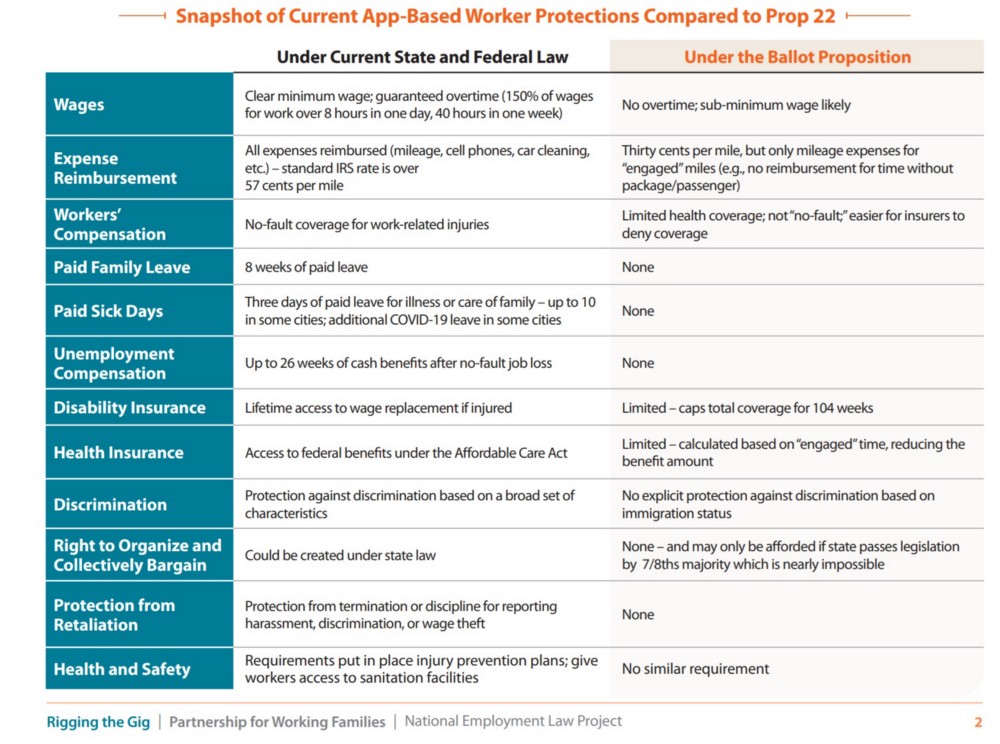
Click to enlarge.
Grievous Threat
A "Yes" vote on Proposition 22 would create a
permanent underclass of workers in California
and set a disastrous precedent for workers
everywhere.
If passed, Prop 22's concepts could infect
other industries and embolden other
billion-dollar companies to bankroll their own
initiatives using Prop 22 as a blueprint for
creating new classifications for their own
workers. In this way, companies could escape
labour laws and boost profits by shifting costs
to their workers.
In his August 10 op-ed in the New York Times,
Uber CEO Dara Khosrowshahi spoke of his vision
for the future of work claiming that labour laws
are outdated and unfair to his workers, and that
there needs to be a "third way" or a new
category of worker. He has the audacity to speak
for the needs of his own workers while heading a
company built on using technology to exploit
them. His is not the only voice with that
message here, having co-authored a similar op-ed
last year with Lyft's cofounders Logan Green and
John Zimmer.
This
twisted, disingenuous narrative of the worker
victimized by outdated
labor laws has been repeated in statements by
politicians, and in
opinion pieces in major business news outlets in
the Northeast. A
professor at NYU Stern School of Business and an
analyst for MKM
Partners turned up on Bloomberg TV on August 11
(1:08:00 mark) and 20
(1:50:15 mark), respectively. Both recited
Khosrowshahi's key op-ed
points, but they also blamed politics for Uber
and Lyft's troubles, not
the companies themselves for ignoring the law.
Both guests either
ignored or were oblivious to the influence of
the rideshare companies'
own workers (and Rideshare Drivers United) on
the course of events.
[...]
Summation
Uber, Lyft, DoorDash, Instacart, and Postmates
are trying to undermine the gains workers in the
United States have won through over 150 years of
struggle for self-determination and the rights
and protections we have today. These companies
need to be stopped here.
A Yes vote on Prop 22 will allow billion-dollar
outlaw rideshare and delivery companies to
increase their profits by changing the rules to
fit their broken, exploitive business models.
Proposition 22, if it passes, will require a 7/8
vote of the California legislature to amend or
repeal it.
Other countries have already begun to bring
these outlaw companies to justice by declaring
that their workers have employee rights.
Californians must participate by voting NO on
Proposition 22 and set an example for the rest
of our country to follow.
Rideshare Drivers United urges all California
voters to VOTE NO on Prop 22, stand in
solidarity with app-based workers, hold these
giant tech companies accountable, and help us
keep the rights, dignity, and respect we
deserve.
The future of workers depends on it.
For more information visit: drivers-united.org
and NoOnCAprop22.com
For the full article, click
here.

Rideshare Drivers United reports that many
workers in their sector are not officially
considered eligible voters in California. They
would not have been able to vote on
Proposition 22 even though it directly affects
their lives as it contains an imposed
collective agreement detailing certain terms
of their employment.
The following executive summary is from a
recent study of ride-hailing and delivery
workers in San Francisco.
On-Demand and On-the-Edge: Ride Hailing and
Delivery Workers in San Francisco,
Chris Benner, PhD, October 8, 2020
Executive Summary
The coronavirus crisis has made visible a range
of essential workers -- grocery store workers,
cleaning staff, home health aides and others --
who in normal times are often ignored or taken
for granted. One category of these essential
workers that has gained particular attention in
this moment are on-demand meal and grocery
delivery workers. Working for well-known
companies like DoorDash, GrubHub and Instacart,
these workers are delivering essential food and
other supplies to people staying at home in the
midst of the shelter-in-place orders. The jump
in demand for these services highlights how
important these on-demand services are in the
midst of our collective efforts to maintain
physical distancing to limit the spread of
COVID-19.
Yet these on-demand food delivery workers,
along with on-demand ride-hailing workers who
fill a similar role in providing transportation
services to other essential workers right now,
are tremendously vulnerable. In providing these
services, both before and during the
shelter-in-place orders, they are vulnerable
both to contracting and spreading the
coronavirus. Their health vulnerability
underscores their financial vulnerability, as
prior to the virus outbreak, they were already
struggling to make ends meet. Being classified
by the on-demand platform companies as
independent contractors, they are also
particularly susceptible to not having health
insurance, paid sick leave, or access to
unemployment benefits.
In May, we released the results of a unique,
in-person representative survey of ride-hailing
and food delivery workers that we conducted and
then suspended when the pandemic hit, as well as
a follow-up online survey. The central findings
were simple and clear -- for a large portion of
this workforce, despite this being full-time
work, they were financially vulnerable before
the outbreak, and the crisis is pushing many of
them to the brink.
Now we have new data from a second in-person
representative survey we conducted in July and
August, focusing on food and grocery delivery
workers from three apps: DoorDash (114 surveys
completed), Instacart (114) and Amazon Fresh
(39).
One note about methodology. Both surveys were
designed to be representative samples of
on-demand work being done in the city, not of
all on-demand workers. This is important.
Representative samples of all people who do
some work for on-demand app companies show many
people working for short periods of time, or
earning only a small portion of their earnings
from this type of work. But we developed two
representative samples based on the actual work
being done in the city, which we believe is a
better basis for understanding labour practices
and developing labour market policy. Our
understanding is that this is the first study of
its kind done anywhere in the United States at
this scale.
The key findings emerging from the new summer
survey focused on DoorDash, Instacart and Amazon
Fresh include the following:
Highly Diverse Workforce
As with the winter survey, we found that this
workforce is highly racially and ethnically
diverse:
- 76 per cent of those surveyed are people of
colour, and 39 per cent immigrants.
- Women and non-gender binary people perform 39
per cent of the food and grocery delivery work,
including a slight majority of Instacart work.
Our survey of ride-hailing workers was much more
male-dominated.
Financially Struggling
All three surveys we've conducted of this
workforce continue to reveal how they are
struggling to make ends meet. According to the
latest survey:
- One-quarter of this workforce is reliant on
some form of public assistance, including 35 per
cent of Amazon Fresh and 33 per cent of DoorDash
workers. This public assistance includes
Temporary Assistance for Needy Families (TANF),
food stamps, housing vouchers, Supplemental
Security Income or the Supplemental Nutrition
Program for Women, Infants and Children (WIC).
- One-fifth of these food and grocery delivery
workers are on food stamps.
- 14 per cent do not have health insurance.
Not a Gig for Most People
As with our winter survey, our latest survey
continues to reveal that app-based delivery work
is largely being performed by full time workers.
- 71 per cent obtain at least three-quarters of
their monthly income from platform work, and 57
per cent rely entirely on platform work for
their monthly income.
- Workers averaged 32 hours per week working
for all the apps, and 30 hours per week for the
app they were surveyed on. Instacart workers
were more likely to work longer hours.
- Nearly one-third are supporting children
through their platform work.
- While there was more longevity among
ride-hailing and food delivery workers prior to
COVID, our latest survey found that 70 per cent
of food and grocery delivery workers have worked
on the apps for less than six months.
Earnings from App-Based Work Are Low
Our latest survey continues to find that after
expenses, earnings from app-based delivery work
are very low.
- While workers average $450 from this work,
after adjusting for mileage expenses, they
average only $270 per week.
- Instacart workers had the highest average
weekly earnings of the apps surveyed ($500); yet
after expenses, those earnings dropped below the
other apps to just $235 per week.
- Nearly one third of workers' time spent
performing food and grocery delivery work is
unpaid time (e.g. driving to the pick-up
location, waiting for orders).
- 18 per cent of DoorDash workers earned an
estimated $0 after deducting mileage expenses
(calculated using Internal Revenue Service
mileage reimbursement rate of $.575 cents per
mile and the survey respondents' estimated
weekly mileage).
Platform Companies Structure Job
Opportunities
Some of the survey findings point to platforms
managing job opportunities in ways that would
likely support claims that these workers are
employees under the "ABC" test codified in
California Assembly Bill 5.
- When workers decline certain job offers, 56
per cent are not offered work for a period of
time, including 60 per cent from Amazon Fresh,
63 per cent of DoorDash, and 51 per cent of
Instacart.
- 25 per cent of DoorDash workers were offered
fewer bonuses and incentives after declining
work.
- 17 per cent of workers were threatened with
deactivation by those apps.
Bicycle Delivery a
Popular but Dangerous Mode of Travel
- More than a quarter of this workforce uses a
bicycle as their primary mode of travel for
deliveries.
- 70 per cent feel unsafe delivering food this
way, and almost one-third stated that they had
felt physically threatened while delivering food
on a bike.
Summary and Policy Implications of Combined
Results from Winter and Summer 2020 Surveys
- On-demand ride-hailing and delivery work in
San Francisco is performed predominantly by
people for whom it is close to full-time work
and their primary source of income.
- This is a highly diverse workforce, with
majority people of colour and a significant
immigrant population. Women also comprise a
large percentage of food and grocery delivery
workers.
- This workforce struggles to make ends meet,
and their circumstances have been made
significantly worse by the COVID-19 crisis.
- When expenses and both unpaid and paid work
time are fully accounted for, a substantial
portion of this workforce are estimated to make
less than the equivalent of San Francisco's
minimum wage (currently $15.59 hour).
- Many also don't receive other benefits they
would be entitled to under San Francisco law if
the companies were classifying them as
employees.
- Many are also not currently being adequately
supported during the COVID-19 crisis, either by
the app-based companies they work for, or by
public policies.
- These findings underscore the importance of
policy makers ensuring that existing city and
state employment laws are enforced for this
workforce, and finding new ways to address the
economic, safety and health, and public health
concerns facing this critical workforce.
Download the full survey results here.
Download October 2020 Supplemental Survey of
Delivery Drivers here.
To read the UC Santa Cruz News Press Release, click
here.

(To access articles
individually click on the black headline.)
PDF
PREVIOUS
ISSUES | HOME
Website:
www.cpcml.ca
Email: office@cpcml.ca
|